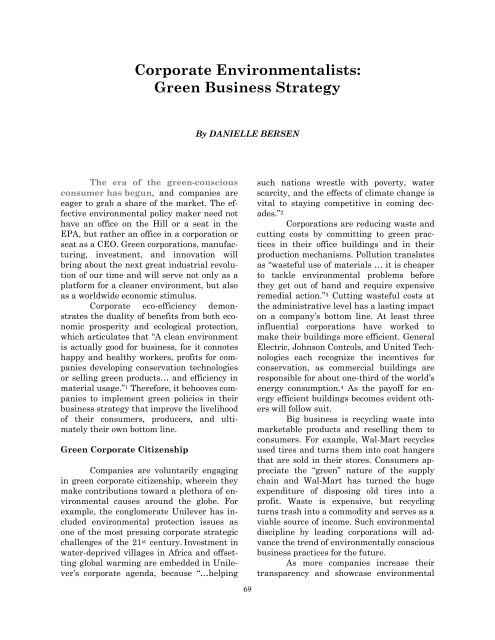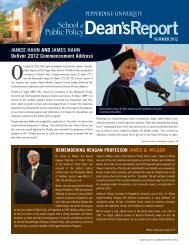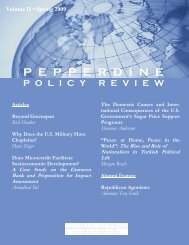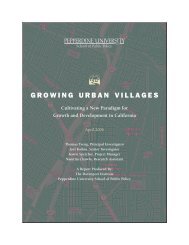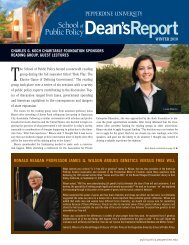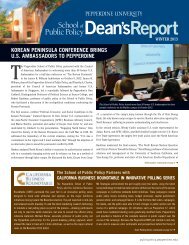Pepperdine University School of Public Policy
Pepperdine University School of Public Policy
Pepperdine University School of Public Policy
You also want an ePaper? Increase the reach of your titles
YUMPU automatically turns print PDFs into web optimized ePapers that Google loves.
Corporate Environmentalists:<br />
Green Business Strategy<br />
By DANIELLE BERSEN<br />
The era <strong>of</strong> the green-conscious<br />
consumer has begun, and companies are<br />
eager to grab a share <strong>of</strong> the market. The effective<br />
environmental policy maker need not<br />
have an <strong>of</strong>fice on the Hill or a seat in the<br />
EPA, but rather an <strong>of</strong>fice in a corporation or<br />
seat as a CEO. Green corporations, manufacturing,<br />
investment, and innovation will<br />
bring about the next great industrial revolution<br />
<strong>of</strong> our time and will serve not only as a<br />
platform for a cleaner environment, but also<br />
as a worldwide economic stimulus.<br />
Corporate eco-efficiency demonstrates<br />
the duality <strong>of</strong> benefits from both economic<br />
prosperity and ecological protection,<br />
which articulates that “A clean environment<br />
is actually good for business, for it connotes<br />
happy and healthy workers, pr<strong>of</strong>its for companies<br />
developing conservation technologies<br />
or selling green products… and efficiency in<br />
material usage.” 1 Therefore, it behooves companies<br />
to implement green policies in their<br />
business strategy that improve the livelihood<br />
<strong>of</strong> their consumers, producers, and ultimately<br />
their own bottom line.<br />
Green Corporate Citizenship<br />
Companies are voluntarily engaging<br />
in green corporate citizenship, wherein they<br />
make contributions toward a plethora <strong>of</strong> environmental<br />
causes around the globe. For<br />
example, the conglomerate Unilever has included<br />
environmental protection issues as<br />
one <strong>of</strong> the most pressing corporate strategic<br />
challenges <strong>of</strong> the 21 st century. Investment in<br />
water-deprived villages in Africa and <strong>of</strong>fsetting<br />
global warming are embedded in Unilever’s<br />
corporate agenda, because “…helping<br />
such nations wrestle with poverty, water<br />
scarcity, and the effects <strong>of</strong> climate change is<br />
vital to staying competitive in coming decades.”<br />
2<br />
Corporations are reducing waste and<br />
cutting costs by committing to green practices<br />
in their <strong>of</strong>fice buildings and in their<br />
production mechanisms. Pollution translates<br />
as “wasteful use <strong>of</strong> materials … it is cheaper<br />
to tackle environmental problems before<br />
they get out <strong>of</strong> hand and require expensive<br />
remedial action.” 3 Cutting wasteful costs at<br />
the administrative level has a lasting impact<br />
on a company’s bottom line. At least three<br />
influential corporations have worked to<br />
make their buildings more efficient. General<br />
Electric, Johnson Controls, and United Technologies<br />
each recognize the incentives for<br />
conservation, as commercial buildings are<br />
responsible for about one-third <strong>of</strong> the world’s<br />
energy consumption. 4 As the pay<strong>of</strong>f for energy<br />
efficient buildings becomes evident others<br />
will follow suit.<br />
Big business is recycling waste into<br />
marketable products and reselling them to<br />
consumers. For example, Wal-Mart recycles<br />
used tires and turns them into coat hangers<br />
that are sold in their stores. Consumers appreciate<br />
the “green” nature <strong>of</strong> the supply<br />
chain and Wal-Mart has turned the huge<br />
expenditure <strong>of</strong> disposing old tires into a<br />
pr<strong>of</strong>it. Waste is expensive, but recycling<br />
turns trash into a commodity and serves as a<br />
viable source <strong>of</strong> income. Such environmental<br />
discipline by leading corporations will advance<br />
the trend <strong>of</strong> environmentally conscious<br />
business practices for the future.<br />
As more companies increase their<br />
transparency and showcase environmental<br />
69


